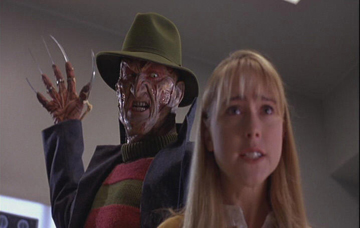|
|
Beyond the Slimy Wall: Wes Craven's New NightmareBy Stephanie Star SmithNovember 15, 2005
Craven reassembled the main cast members from the original Elm Street, Heather Langenkamp, Robert Englund and John Saxon, and has them playing themselves for most of the film. The premise is that Freddy Krueger is a mite unhappy having been killed off in the sixth film in the franchise - the cleverly titled Freddy's Dead - and has decided that his return from the netherworld isn't going to take place on the silver screen, but in real life. This also brings Craven himself into the film, as he, Englund and Langenkamp are all being haunted by Freddy, and not just in their nightmares, either. But Freddy's main target is Langenkamp's four-year-old son, for it is only by taking over the boy's dreams that Freddy can ultimately succeed in making his escape from the dream world into this plane of existence, the better to wreak havoc on a much wider scale. One of the hallmarks of the first Elm Street film was its ability to slide subtly into the dream world without any obvious visual markers; it was only when Freddy appeared and the killing began that one realized a particular character had fallen asleep. New Nightmare takes this concept even further, blurring the boundaries between waking and sleeping, the celluloid world and what we call reality, and the dreamer is no longer the only one in danger. Craven works this in quite the stealth manner, too, eventually obliterating the boundaries to the point where no one, either on the screen or viewing the film, is exactly sure where things stand on the film character-versus-real-life counterpart scale, much less the waking-to-sleep spectrum. That sense of never being safe, of not being able to trust what your eyes and ears are telling you, gives the film a creepy feeling that is too often lacking in recent horror output, where it all too often seems the goal is to throw as much stage blood and startle-jumps on the screen as possible and hope the audience doesn't catch on until after the 90 minutes-or so has elapsed that you never really scared them at all, or even held their interest all that much. Wes Craven's goal is to not only give you genuine scares, but to create a film that stays with you after the end credits roll, that leads you to consider, however briefly, not turning off that last light before surrendering yourself into the arms of Morpheus. It might seem strange to discuss acting in the context of a film where most of the characters are playing themselves, but despite what some might tell you, playing yourself in front of cameras is not that easy a thing to do. I mean, think about it for a minute; what if someone turned a camera on you, gave you some lines to say, and then told you, "Play yourself." How does one begin to determine just what playing yourself means? Even given the fact that actors tend to be more aware of their own vocal tics and standard gestures, it's still a bit of a job to figure out how to bring yourself into lines that are written for you, how to act "normal" in front of a camera, and how to make all of that seem as natural as if the audience had been given a magic camera obscura and was peeking in on your day-to-day existence. So kudos go to Englund, Langenkamp and Saxon for managing to do just that, and a special pat on the back to Wes Craven, who spends his time behind the cameras, for managing not to come off wooden when called upon to play himself in the flick. The young actor who plays Langenkamp's son also turns in a journeyman performance, not an easy thing for a child of such tender years. At just over an hour-and-three-quarters, New Nightmare zips along its roller-coaster track at a brisk pace, piling the chills and terror on nearly from the get-go, and with only the briefest of pauses so that the viewer almost, but not quite, catches his/her breath before the next horror appears. With its solid story and performances, New Nightmare adds an excellent chapter to the Freddy Krueger saga, one that puts a nice finishing touch on the franchise without completely shutting the door to new films, yet still satisfyingly ties up the series. It's a great addition to your TiVo or video rental list, one that won't disappoint, particularly if you're a fan of Freddy and his knife work. I do recommend you catch the wide-screen version, however, as Wes Craven makes full use of his canvas and fills the frame wonderfully with visuals and F/X. I see by the shadows falling from my bust of Pallas that our time is up. Until next time, then, when we will once again venture Beyond the Slimy Wall.
[ View other Behind the Slimy Wall columns ]
[ View other columns by Stephanie Star Smith ]
[ Email this column ]
|

|
|
|

|
Thursday, October 31, 2024
© 2024 Box Office Prophets, a division of One Of Us, Inc.


